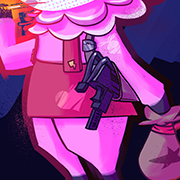|
John Murdoch posted:
In my experience, it's usually one or two designers and whatever art and programming resources they can steal from the flashier or more fun (to work on) parts of the game. They often understand the importance of the on boarding sequence but they are also often understaffed, I think. mutata fucked around with this message at 06:36 on Sep 18, 2017 |
|
|
|

|
| # ? Apr 16, 2024 12:50 |
|
Fortunately in VR, we have the benefit of very few buttons and way more kinesthetic actions, so players are more drawn to just gently caress with everything, particularly in smaller environments. Not that it makes tutorializing easy, but given that our studio doesn't use any artificial locomotion in our games, it's pretty easy for us to trap the player until we make sure they have the basics down. 
|
|
|
|
mutata posted:Speaking of diversity, I absolutely think more guidance, training, consulting or hiring of people with outside professions like teaching or psychology would mostly be a great thing. God, yes. The more games are relying on real world skill specialties like architectural design, fashion design, writing for games, the more we need to start hiring ouside of game enthusiast circles. I keep raving about Marvelous Designer, but it's a perfect example of real world clothing and garment design knowledge being made applicable to games.
|
|
|
|
I've done software development (c#, web/windows based apps) for the last 15 years or so, how does game dev compare to a "typical" software dev (think web-based app talking to sql, along those lines)? I'm completely self taught so I wonder how much formal training helps in that industry (algorithms, complex maths, etc).
|
|
|
|
I'm an ideas man.... Just wondering how plausible and expensive it would be for someone with no programming/dev experience to get their own personal game concept made into an actual functioning game assuming at least at the bare bones level.
|
|
|
|
I recently watched a few youtube videos on Games companies like LJN and Blast! They both have reputations as being a bit scummy by buying up licenses and making cheap games that make money because people love movie tie-ins, but I was wondering if that is how a company like that would see itself, or if you knew anyone who worked there using it as a potential springboard for greater work in the future. I think I'm mostly wondering if they would agree about their public reputation and just don't care, or if it's a case of something else (if that makes sense.) Are there any other companies that do see themselves in this fashion? Or what makes it possible for a company like that to flourish?
|
|
|
|
PotatoManJack posted:I'm an ideas man.... Sadly, ideas are cheap. We all have great ideas for games we want to make. What would set you apart from everyone else in this respect is having a ton of cash and time to spend on getting a team of other people to spend their time building your ideas into reality. Having a killer pitch indicating you've really put a lot of thought into this idea and can get people excited about it helps, but it all comes down to money in the end. How much money exactly depends on how elaborate the idea is, what exciting features you want to include, fidelity of the artwork, etc.
|
|
|
|
I have a question about patching/game balance. What are some thought processes on priority? For example, there's a game based on a famous horror franchise that is loved/hated for some of its buggy behavior. They made a patch that nerfed some game play aspects that, at the same time ignored non-functional gameplay elements that are not dummied out. You can probably guess which game/developer I'm referencing, but I'm not trying to call them out. I've seen decisions like this happen a number of times from a wide number of developers and I've even seen it on non-competitive titles where it seems that game balance shouldn't be as high a priority as functionality. Tl;Dr how come patch balance over functionality??
|
|
|
|
A.o.D. posted:They made a patch that nerfed some game play aspects that, at the same time ignored non-functional gameplay elements that are not dummied out. I'm a moron and I don't understand what this sentence means, help
|
|
|
|
A.o.D. posted:I have a question about patching/game balance. Broken functionality is usually broken due to bugs, which can be difficult to find the root cause, or require heavy reworks to fix. Changing balance usually involves tweaking a set of numbers. You can fail to do it WELL, but you can't fail to actually do it.
|
|
|
|
PotatoManJack posted:I'm an ideas man.... I'm not trying to be insulting with this but, just so you know, it is not uncommon that "ideas man" is used to mean "doesn't like to do any actual work" in the games business.
|
|
|
|
Dr Cheeto posted:I'm a moron and I don't understand what this sentence means, help They nerfed a numerical trait bonus for your character while some other numerical trait bonuses that are nearly identical remain broken. This isn't about the developer in question, I just wanted an insight as to why that happens. A.o.D. fucked around with this message at 15:30 on Sep 19, 2017 |
|
|
|
I have no idea what game/developer you're talking about but fixing bugs can take a long time if the source of the bug is proving elusive or it's just a hard one to fix. Things like balance changes are probably being worked on by other developers - you can only have so many people working on a bug before they're just stepping on each other's toes constantly. Patches are often put out to some kind of internal schedule(we try not to push patches on a Friday, for example, because if something goes wrong there'll be nobody in the office all weekend to deal with it, we don't have the resources yet for 24/7 support), so if the bugfix isn't ready in time for the patch to go out but the balance changes are, that's how you end up with 'trivial' fixes appearing to be coming out with higher priority than bug fixes.
|
|
|
|
inre patch balance vs. priority... I know it sometimes feels like dev time is zero sum but it isn’t. If you have a bug in your network code, you’re probably not going to put the art team on a fix for it. Those people can be working on other things, so unrelated content or fixes could pop ahead of a bugfix for something that’s comparably more important. There are often dependencies too – the network team can be pulled off of what they are doing to fix the issue you’re talking about … which will delay the work they were doing … which means the people who are building content for what they are doing might be sitting there waiting … which means a feature is delayed and a dozen people are waiting for tasks. Maybe that bug can wait? Patches have a bunch of other hassle too, potentially, depending on your engine and pipeline / process. Like, some engines enjoy touching a lot of files on almost any change, which means that just popping a balance number fix or a new 5MB gun mesh (or whatever) in can produce a 17GB download for players (and everyone really, really, really likes a day with multiple 17GB patches). Most devs are also not going to slam together a patch and hope for the best. This is how you get calls at 3 in the morning that begin with "people on the forums are saying that launching the game erases their harddrive.” So you’re going to go into lockdown and send patch off for testing. That takes time and disrupts other development. There are a lot of gotchas with what to patch / when (also with everything). This is not to say that evey patch delay is warranted. I don't know who you're talking about but it's possible that they don't consider the thing you think critical to be critical or they're just not working on the right things or they've decided its fun to be evil or whatever.
|
|
|
|
A.o.D. posted:Tl;Dr how come patch balance over functionality?? Bugs are generally more complicated to fix than balance patches and the update schedule can sometimes be set weeks in advance, sometimes a fix makes that lock-in date, sometimes not. Entirely possible for bugs and balance to be worked on at the same time.
|
|
|
|
When you're playing a game as a developer, what aspects or features make you go "oh this is programmed/optimized very well"? Like what games past or present are renowned within the industry for being a triumph of very elegant coding?
|
|
|
|
exquisite tea posted:When you're playing a game as a developer, what aspects or features make you go "oh this is programmed/optimized very well"? Like what games past or present are renowned within the industry for being a triumph of very elegant coding? Optimization and performance isn't necessarily a function of elegant coding, though that is a factor. It's typically a team effort among programmers, artists, and level designers. In general it's something that a studio does really well for most of their games rather than one in particular. For example, Bungie always does a great job and they utilize S/Z transitions really well to make sure you're never seeing new areas load in while making very gorgeous locations. Horizon Zero Dawn is utterly gorgeous and packs tons of detail in to the world while performing really well. Likewise, Red Storm's The Division has an enormous amount of props in the environment and still runs great. However, there is one that stands out for me as being one of the very best. Even as a tech artist, Quake 3 Arena's engine (idtech 3) still holds that crown for me. I can't comment on the actual programming aspects, but that iteration of the idtech engine is just awe inspiring. It ran smooth like butter even on a toaster. Idtech3 was used for some of the most memorable MP games of that era: Call of Duty, Jedi Knight 1&2, Wolfenstein Enemy Territory and Return to Castle Wolfenstein.
|
|
|
|
JPrime posted:I've done software development (c#, web/windows based apps) for the last 15 years or so, how does game dev compare to a "typical" software dev (think web-based app talking to sql, along those lines)? I'm completely self taught so I wonder how much formal training helps in that industry (algorithms, complex maths, etc). The biggest difference between the two is probably how focused you have to be on performance in games. If you're aiming for 60FPS in your game, it means you have around 16ms to execute everything. If you're doing a VR title, that drops to around 11ms (due to VR being 90FPS). There's also less of a concern with things being perfectly correct, and more focus on them being fun or being mostly correct and fast. Code bases in games also tend to be pretty huge. OMDU has over 8,000 files in our solution, with some of those files being 10-15k lines of code. I don't happen to have a line counter handy, but I wouldn't be surprised if we had somewhere north of 500k lines of code, and that's actually probably shrunk from the peak on this project. Different types of games also bring their own sets of challenges as well. An RTS for example, normally uses a distributed deterministic simulation (ie, everyone runs the entire game in lock step with each other), so you need to make sure that when you're writing code for it, that your code will behave the same on all of the clients, otherwise you end up with the game state desynchronizing, and the dreaded "desync, game over". If you're building an FPS/TPS, you generally have dedicated servers, which means separating the logic between client logic and server logic, and ensuring that everything works correctly in both local/singleplayer, and in dedicated server multiplayer (and also potentially "listen" server, or having one of the clients act as a server). I feel like this is the sort of topic that I could probably spend hours thinking of additional differences to talk about, so I'm going to leave it here for now. As for being self taught, I'm pretty heavily self taught as well. The main things that are probably relatively uncommon to learn that are helpful for game dev would be trig and vector math in general (both 2-D and 3-D are relevant). Algorithms wise, I haven't seen too many problems where I've been wishing I had taken an algorithms class, although brushing up on that is on my to-do list. I will say, the Fisher-Yates shuffle is a really handy algorithm for games, which was something I picked up off of a co-worker.
|
|
|
|
I'm not sure what's the right term for this, but why does the games industry seem to be so... fanatic? For example, I'm a software dev, I work on all kinds of products I wouldn't use myself, I don't have any investment in them. I'm invested in my job and that's what I like. I doubt all the consumers and reviewers of various products have any deep attachments to them as well. But in games everyone seems to be required to "drink the koolaid". To work in games you have to love games, to write about games you have to breathe games. Everyone is a gamer, whether they're developer, press, or customer, and that seems to encourage all kinds of bias and inner circles and what not. Is it all just an act for marketing, a natural result of working on creative media, or something else? SupSuper fucked around with this message at 18:32 on Sep 19, 2017 |
|
|
|
SupSuper posted:I'm not sure what's the right term for this, but why does the games industry seem to be so... fanatic? I'm not sure if non-Game Dev's are allowed to answer, but I think you nailed it with your "a natural result of working on creative media". People who work in music typically LOVE music, People who work in movies typically LOVE movies, I'd imagine the same goes for games.
|
|
|
|
SupSuper posted:I'm not sure what's the right term for this, but why does the games industry seem to be so... fanatic? The key difference in my mind between a piece of software and a video game (or other piece of creative media, for that matter) is that games invite you to experience EMOTION whereas software is a tool that one uses to further a task, need, or goal. Emotions produce fanaticism. It is definitely not an act for marketing purposes, although sometimes a dude in a hoodie on a stage somewhere can definitely be putting on a razzmatazz show. In fact, fanaticism part of what's holding some quality of life issues that game dev has: We all know and management knows that if we complain about certain aspects of our job that there are a few dozen people out there who would be happy to take our place.
|
|
|
|
I'm a hobbyist game developer working for a startup, and I was wondering how small indie studios usually handle social media. Is it common for a small studio to handle social media themselves or do they contact or hire a social media manager?
|
|
|
|
PotatoManJack posted:I'm an ideas man.... How easy it is with no experience depends on what game you want to make. Easy - and open source! Want to make a 2d puzzle game? PuzzleScript: http://www.puzzlescript.net/ Want to make a story game, literally just text? Twine: http://twinery.org/ Medium Want to make an rpg, something like final fantasy? RPG-maker: http://www.rpgmakerweb.com/ Hard Want to make a video game in an engine, coding in c#? Unity: https://unity3d.com/ Want to make a video game in an engine, coding in c++ or blueprints? https://www.unrealengine.com/en-US/what-is-unreal-engine-4 Want to make a video game in a functional programming language working with low level openGL bindings? Check out the haskell programming language: https://www.haskell.org/ Don't make a game in haskell for your first game. Do check out puzzlescript - its a fun little thing and there are some really fantastic games made in it.
|
|
|
|
So, I'm interested in getting in the gamedev field but I'm absolutely scared that crunch will eat me alive and I desperately want to avoid it. I'm interested in just junior design stuff but I have a LITTLE programming background and whatnot, and I know to keep filling out my portfolio with projects but, that crunch man, it just is so intimidating that I stop before I start. Is there anything to say to console me or is it just "YUP stay out if you hate crunch"
|
|
|
|
SupSuper posted:I'm not sure what's the right term for this, but why does the games industry seem to be so... fanatic? On one level, gaming isn’t really more fanatic than other jobs, just the content of the fanaticism is visible to people who aren’t in the middle of it. I know people who code mortgage software. They’re as fanatic about mortgage processing and how their stuff integrates with existing client systems as I am about games. In anything you want to do well at, you want people who have a relevant frame of reference and expertise. If we need to get a crosshair in a game, right now my “design document” can be a two minute conversation. The programmer who would do it is literally playing PUBG right now, he knows what a crosshair is and what questions might need to be answered before he can start making one and what makes one feel good or bad to a player. If I were doing this with a non-gamer, it introduces a lot more friction. A lot like the door example, imagine all of the details you’d need to specify if you were doing this with someone who had never used a crosshair in a game and had no concept of what made it good or bad. What shape should it be? How large? Where should it be located? What happens when you iron sight? What color is it? Is it the same for every weapon? How do we get new ones in the game? How do we associate them with specific weapons? Does the color change if the crosshair might be lost against the background? Is the crosshair “true” at all ranges? Where are the projectiles actually spawning when you take a shot? Do animations change this? Does the ring represent where bullets might fall? Does the size of the ring change based on the distance to what you’re pointing at? How quickly does that ring grow when you fire? Shrink? Is that linear? Is it the same for all weapons? How do we set that? Does anything happen on the crosshair when you hit? On another level, gaming is more fanatic. Before someone paid me to make games, I worked on games. In study hall, during class, on break at non-gaming jobs, on weekends, whenever. My mom has “designs” I sent to “Mr. Atari” when I was five. I do the same kind of stuff today. When I’m done working on a game here, I go home and work on one of my side projects or play a game. I have had many jobs where this wasn’t the case – I didn’t go home from work and deliver pizzas or ring up purchases a lot when I was in highschool. A lot of game jobs are fanatic because a lot of people attracted to making games are fanatic about it. That’s not uncommon in a lot of fields, I don’t think? If you ask a vinter about wine, they typically don’t say, “Oh, I don’t like to drink wine.” If you ask a movie director about her job, she probably will not reply with, “Pppft. Movies? Who watches those?”
|
|
|
Rob Filter posted:Don't make a game in haskell for your first game. Why would you ever consider Haskell for a videogame?
|
|
|
|
|
Forer posted:So, I'm interested in getting in the gamedev field but I'm absolutely scared that crunch will eat me alive and I desperately want to avoid it. I'm interested in just junior design stuff but I have a LITTLE programming background and whatnot, and I know to keep filling out my portfolio with projects but, that crunch man, it just is so intimidating that I stop before I start. Is there anything to say to console me or is it just "YUP stay out if you hate crunch" I'm like five years in and managed near zero crunch so far, aside from oh crap we need to submit a thing definitely today can you stay back an hour or two? once in a while. I think it may help that I've only been a part of small studios? It is definitely possible to find a studio where upper management would rather push back schedule than grind the staff into the ground for extended periods. Thermal Anomaly posted:I'm a hobbyist game developer working for a startup, and I was wondering how small indie studios usually handle social media. Is it common for a small studio to handle social media themselves or do they contact or hire a social media manager? I've seen both! Whether hiring a media relations specialist or the CE/FO handling it - this can either be due to the low profile of the company and the relative low volume of social media work or that the stakes are high enough that a single misplaced tweet can make headlines so that responsibility may not be delegated. GeeCee fucked around with this message at 22:00 on Sep 19, 2017 |
|
|
|
do bigger games (outside of unity) ever use C# or are they usually C++ for optimization? what languages are most common for different types of games? i'm curious how much the choice of language is a factor in speed for something like, say, GTA as opposed to engine optimization or efficient algorithms or whatnot.
|
|
|
|
Stexils posted:do bigger games (outside of unity) ever use C# or are they usually C++ for optimization? what languages are most common for different types of games? i'm curious how much the choice of language is a factor in speed for something like, say, GTA as opposed to engine optimization or efficient algorithms or whatnot. It really depends on the game. Once you start making "bigger" games, you start running into interesting optimization problems that a lower level language (C++, for example) lets you tackle. For example, once the data structures and other tech start to really get nailed down, you can start making memory optimizations with your data in mind. You can also make low level optimizations to algorithms / design such that you optimize hardware usage (eg: CPU cache). When working in a managed language (like C#), you can run into problems where you are fighting against the framework (contrived example, garbage collection running in a way you don't want it to which causes a hitch). Conversely, if you don't need to deal with the optimization / low-level headaches, a C# / Unity approach is totally valid. Namen fucked around with this message at 06:05 on Sep 20, 2017 |
|
|
|
SupSuper posted:I'm not sure what's the right term for this, but why does the games industry seem to be so... fanatic? Some people say it's the creative/emotional aspect and they're definitely right. Most of us are just gamers turned developers, so we just love video games. That said, most of us aren't running studios and I think the old guard is partially to blame for this. Back in the early days of games, there was no E3, and videogames tended to be shoved in a back corner at whatever consumer electronics show was going on at the time. Demands for more space and to be taken seriously where met with a resounding PFFFFT, so games spun off into their own showcase, and E3 was born. Now I don't want to credit the ESA entirely for the crap parts of game culture, but I'll definitely credit the HELL YEAH VIDEO GAMES parts to it. The whole initial reason for E3 was kinda the same creative passion that drives most of us, mixed with a bit of a rebellious 'gently caress all y'all' and some showmanship. I think that's at least partially responsible for the kind of fanaticism you'll see from both players and devs. Forer posted:So, I'm interested in getting in the gamedev field but I'm absolutely scared that crunch will eat me alive and I desperately want to avoid it. I'm interested in just junior design stuff but I have a LITTLE programming background and whatnot, and I know to keep filling out my portfolio with projects but, that crunch man, it just is so intimidating that I stop before I start. Is there anything to say to console me or is it just "YUP stay out if you hate crunch" I've worked a grand total of two years in the industry, and I'm 24. The worst crunch I've experienced was 60-hour work weeks doing publisher-side QA. That poo poo sucked. If you wind up in a role like that, particularly at one of the major publishers, it's not uncommon. Studio-level QA was way better. I think I worked a grand total of 12 additional hours during a 4 month contract on a very big franchise. My current job actually saw me do a 16-hour day, but we all came in at noon the next day with a collective "hey that sucked rear end how about we never do that again." So overall, I don't have a ton of horror stories. There've definitely been some awful days, but if you can avoid working at one of the really big publishers you're well on your way to avoiding a lot of crunch. Another trend I've noticed is a lot of senior devs in their 40s or so are now starting small-to-mid sized studios and learning from their previous studios' mistakes, including those of bad scheduling and crunch. The problem isn't solved, but it seems to be steadily improving. Chunderstorm fucked around with this message at 06:32 on Sep 20, 2017 |
|
|
|
I'll chime in to say I've been working in games for about 7 years now and I've never had to crunch in that time. I've not worked in AAA though, it seems much more common in those places. The horror stories are real, but crunch is not completely inevitable in games jobs, and I think more developers are waking up to how harmful and counterproductive it is.
|
|
|
|
Pretty much nobody crunches anymore (in AAA) besides Naughty Dog and Rockstar. Just about every other studio has wisened up, but it's just super embedded in those company cultures. On the last game I shipped, the studio opened 1-2 Saturdays per month toward the end, and started offering dinners 4 nights a week, but we still closed the doors and kicked everyone out at 9PM. Compared to some of the first games I worked on, it was a walk in the park. Do you have any responsibilities besides yourself? If you're a young single person, crunch really shouldn't bother you at all. It isn't uncommon for white-collar salaried media jobs to demand 50-60 hours per week anymore. Which I'm not defending, just pointing out that the game industry isn't unique in that regard. Where crunch really starts to hurt is if you have a family or any other dependents to take care of. Working a few extra hours per day isn't actually that taxing if you get the right sleep and nutrition, but if you have kids, the face time you're missing is irreplaceable. Basically, if you're only worried about crunch for how it personally make you feel, you don't have anything to worry about. If you've got others to look out for, make drat sure your studio is serious about avoiding crunch, or have an exit plan ready. But it's games, you should always have an exit plan ready. Lastly on the "drinking the kool aid" point, I'd just like to add that there is a strong incentive within the industry to maintain this culture, as it allows studios to underpay talent and throw them away when they get too demand-y. There's always a fresh crop of young grads to replace you, and they don't want you to forget it. That said, from time to time we've had non-games people fall into a role for whatever reason, and I always enjoyed working with those people more than the gamers. At this point I think I've been here too long to join them and get a real job though.
|
|
|
|
Gearman posted:Optimization and performance isn't necessarily a function of elegant coding, though that is a factor. It's typically a team effort among programmers, artists, and level designers. In general it's something that a studio does really well for most of their games rather than one in particular. Is a well-coded engine just something that an experienced programmer can kind of suss out from playing the game? Like you're playing some old-school shooter and think to yourself "they handle floating point arrays really well here" or something similar.
|
|
|
|
SupSuper posted:I'm not sure what's the right term for this, but why does the games industry seem to be so... fanatic? Just like other software, games get good through iteration. In software dev, you might interact with the customer once a month. They'll give you feedback, you agree more work, you produce a new version, they review again. In game dev, the developer is also the customer, because they are a gamer. That means that depending on how much faith you are willing to put in individual developers, you could see hundreds of iterations a DAY. One of the greatest things is to give a team a problem, point them in the right direction, and then a couple of days later review it and they've solved it in a way you wouldn't have even though of because they just ran with it. That wouldn't be possible if they weren't gamers. You'd get back the exactly solution you asked for, rather than a solution to the problem you identified.
|
|
|
|
eshock posted:
I have to disagree with this point. Whether you're 23 and single or 43 with three kids, crunch should always bother you. Your time is no less valuable just because you're young and have fewer responsibilities. You can always make more money, you can't ever get more time. The time to be concerned and pushing back on crunch is when you're young and single and just getting in the game.
|
|
|
|
eshock posted:Pretty much nobody crunches anymore (in AAA) besides Naughty Dog and Rockstar. I guess it depends on your definition of "AAA" but plenty of well known shops aside from these two have crunch. That said, I agree that a lot of experiences from the old days have been carried by people who are now in leadership positions and this has improved crunch in general across the industry. If you're worried about crunch, pay attention during the office tour of your interview. Mostly twenty-somethings playing whatever game is popular in the middle of the workday? That crew is going to be crunching. A lot of pictures of families on the desks and everyone is head-down when you stroll through? Probably not going to see near as much crunch. Keep in mind that anti-crunch can be bad too. I've been at shops in Europe where security guards walk through the office at quitting time and force everyone to leave. Middle of figuring out a difficult problem? Sorry, out. I know a shop where the boss has made a lot of public statements about not having any crunch. It's one of the selling points when people interview there. He patrols the office himself at quitting time to express disappoinment if you're still at your desk. Noble perhaps, but he does this without modifying assignments to suit. So now not only has someone given you 60 hours of work to do in a week, but they're also going to be upset if they see you using more than 40 hours to do it. Good times.
|
|
|
|
exquisite tea posted:Is a well-coded engine just something that an experienced programmer can kind of suss out from playing the game? Like you're playing some old-school shooter and think to yourself "they handle floating point arrays really well here" or something similar. I'm not a programmer so I can't really say with any certainty. In general, it's going to be easier when something is done poorly than when something is done really well and that's largely a function of human psychology. You tend to remember when things go wrong than when things go as expected. If there are props or entire chunks of geometry popping in when you turn a corner, you know something is wrong. If you don't see any of that then you don't really know or care how well the memory was managed there, because it worked as expected. Without digging in to the code, it's likely going to be really difficult to suss out any degree of quality in the programming. Here's a couple instances of people digging in and finding interesting things The famous 'fast inverse square root' : https://betterexplained.com/articles/understanding-quakes-fast-inverse-square-root/ And on the graphics front, dissection of GTA V's rendering: http://www.adriancourreges.com/blog/2015/11/02/gta-v-graphics-study/
|
|
|
|
Gearman posted:I have to disagree with this point. Whether you're 23 and single or 43 with three kids, crunch should always bother you. Your time is no less valuable just because you're young and have fewer responsibilities. You can always make more money, you can't ever get more time. The time to be concerned and pushing back on crunch is when you're young and single and just getting in the game. Everyone has a right to make a decision about what their time is worth and different people have different capabilities to deal with stress and a lack of downtime. My personal evaluation rests on the question of being taken advantage of. That is, am I being asked to work crunch because things have developed in a way that getting something done faster is an advantage or necessity? Or, am I being asked to work crunch because someone wants to pay me for 40 hours or work but get 80? I am not a pro-crunch person (I was in my 20s), and I don't intend this as an argument in favor of crunch, just as something to consider -- I do not know a single person in any field who is what most people consider successful who got there working 40 hour weeks. (I do know some very disciplined writers and some people who have become sought-after consultants who, today, work <20 hour weeks, but even they have deathmarch stories about how they got there.)
|
|
|
|
I won't be surprised if this gets ignored as people seem to have a really hard time talking about money, maybe for fear that they'll realize they're under paid, or maybe because jealousy... No clue. I know this varies depending on location, but what's the typical pay like for the assorted roles in game dev?
|
|
|
|

|
| # ? Apr 16, 2024 12:50 |
|
exquisite tea posted:Is a well-coded engine just something that an experienced programmer can kind of suss out from playing the game? Like you're playing some old-school shooter and think to yourself "they handle floating point arrays really well here" or something similar. In general, it's how well it runs under high load. The evident difference between, say, a novice programmer coding a Pong engine and a veteran programmer coding a Pong engine is slight, because there's never any situation where the engine's going to run under load in normal gameplay circumstances. A game like H:ZD that has an enormous number of complex variables in terms of both gameplay and visuals that doesn't stutter and loads seamlessly has to, by definition, be coded well. Like Gearman mentioned, though, the "how" of good coding isn't something you can ever really tell just by an outside glance, aside from educated guesses.
|
|
|































